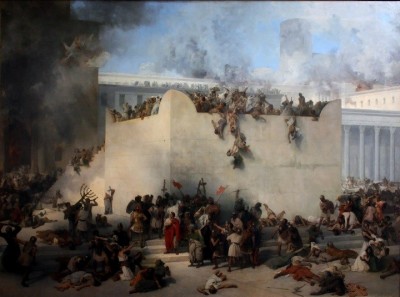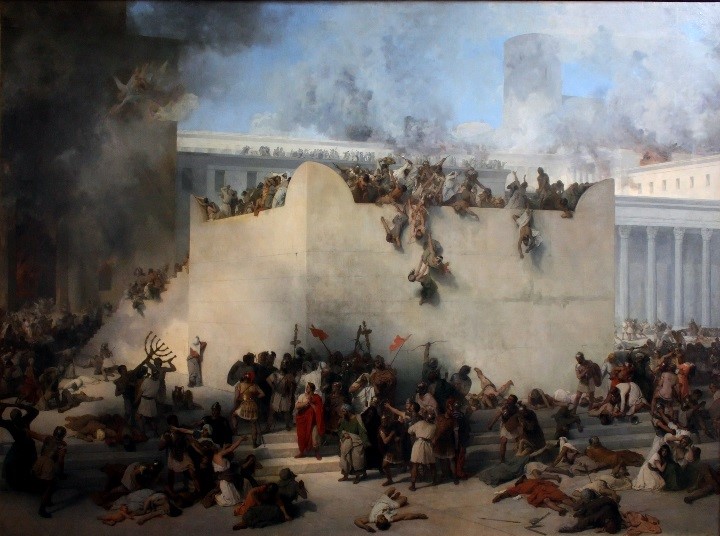
During the Nine Days preceding Tisha B’Av, the 25-hour fast commemorating the destruction of the Temples in Jerusalem,we reflect on baseless hatred (sinat chinam). The Talmud teaches us that it was the baseless hatred among the people Israel that partially brought about the destruction of the Second Temple. (Along with, you know, high-level political drama with Rome.) We learn in Tractate Yoma:
“But why was the second Sanctuary destroyed, seeing that in its time they were occupying themselves with Torah, [observance of] precepts, and the practice of charity? Because therein prevailed hatred without cause.”
…and so it is incumbent upon us to reflect on the baseless hatred in our own lives – and in the world today – as we fast to commemorate its manifold victims.
If you ask me, we in the Jewish community have a lot of reflecting to do: baseless hatred is eating our community alive as the war in Gaza continues.
What is baseless hatred? It is a malicious refusal to recognize the humanity or dignity in those inconvenient for us or those we see as below us. It is characterized in oppression, silencing and exclusion. And we see so much of this hatred now.
Is it too much to bear to acknowledge the 1,800 dead Palestinians (one out of every thousand in Gaza) alongside the several dozen dead Israelis? Is it too scary to acknowledge that our co-religionists have been accused of war crimes? Is it too much when it involves realizing our own racism against Arabs? Is it too much when Jews refuse to acknowledge our fellow Jews who are beating anti-war demonstrators and Arabs in Tel Aviv and Haifa?
And on the other side, is it also too scary to acknowledge that most of the people in line from increased rocket fire from Hamas are Mizrahi, Bedouin, and Ethiopian? Or that it has left 1967 Israel’s Arab minority in a perpetual state of fear?
All the excuses may be lobbed: “they hate us.” “Look at the anti-Semitism in Europe.” “Yonder is the Amalek of today.” [Saying that, by the way, is discouraged heavily.] “We don’t hate as much as them.” Does that excuse our own baseless hatred? Absolutely not. No number of excuses can undo the reality of oppression, no number of praises raised to God justify thousands of deaths or a continued humanitarian blockade. Mind you, this sort of activity might be creating even more hatred on both sides: Is it too scary to acknowledge that up to half of Gaza’s children suffer moderate to severe PTSD as a result of Israel’s various operations, and a similar proportion in Sderot due to rocket fire? (As someone who deals with much milder PTSD, let me tell you, it is not fun.)
God may seem hateful, and it may be tempting to accuse God of baseless hatred Himself. I would not argue that it is hatred that God exhibits, but fury. Rather, He is angered at the wanton oppression inflicted in His name by the Israelites: the slavery, the callousness, the lack of recognition of dignity. In Isaiah, He rejects Israel’s sacrifices and fasts, for the baseless oppression those who claim to act in God’s name inflict. “Is this the meaning of your fast?” we are reminded every Yom Kippur.
So I ask: what is the meaning of this fast without confronting our baseless hatreds? The entire approach to the conflict, across the political spectrum, is racked with this baseless hatred. There is the more identifiable racism and justification for innocent deaths on the right. I honestly question the ability to use a “right of defend” to dismiss the deaths of over one thousand civilians, no matter how fine-tuned the hasbara. The very fact that a now-deleted editorial article titled “When Genocide Is Permissible” ran on a Times of Israel-sponsored blog speaks volumes to the sinat chinam present in much of Jewish society today.
But there is also on the left a disregard for other fears, and a seeming unwillingness to discuss the class and ethnic ramifications of who is under rocket fire right now. I, even, as someone who falls on the left wing on this conflict, have forgotten from time to time what many Sderot citizens live with. On both sides, there is a demonization of the other person’s humanity.
What do I want? Asking people not to hate is a naïve and unachievable proposition. What I would rather hope is that Tisha B’Av offers us an opportunity to confront, once again, a communal demon that we cannot simply wish away, and one that is unlikely to not go away for a long time.
“Restore us unto you, oh Lord, and we shall be restored; renew our days, as of old.”
-Lamentations 5:21
This article started off as a Facebook status on Yeshayahu Leibowitz’s idea of idolatry.
Jonathan P. Katz is a recent graduate of the University of Chicago.

